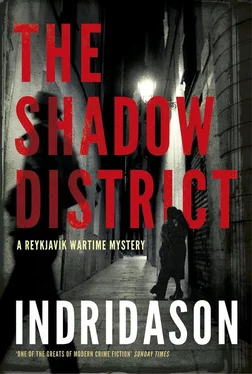‘Perhaps you should wait for the lawyer,’ said Flóvent. ‘A lawyer would help you understand what will happen next.’
‘I don’t want a lawyer. I just want you to stop this. I want to go home. I’m missing my lectures. This is absurd. It’s complete madness.’
Flóvent now took out the pages he had found in Jónatan’s room and placed them on the table in front of him. Thorson was already familiar with their contents. Jónatan stared at the pages, his face suddenly blank.
‘Are these yours?’ asked Flóvent.
Jónatan didn’t answer.
‘Is this your handwriting?’
‘Yes,’ said Jónatan. ‘It’s my handwriting. Where did you get them?’
‘From your room,’ said Flóvent. ‘Then you know what these pages contain?’
‘Of course I do,’ said Jónatan. ‘I’m collecting material for my thesis. You mean you actually took these from my room?’
‘This account is taken from old court records, isn’t it?’ said Flóvent.
‘Yes.’
‘I looked up the case. You’ve copied it down almost word for word.’
‘Of course I have. It’s a source.’
‘Would you care to tell us what the trial was about?’
‘You ought to know if you’ve read it,’ said Jónatan.
‘It’s a rape case,’ said Flóvent.
‘Yes.’
‘Involving a young girl and a farm labourer.’
‘Yes.’
‘The circumstances of the case were highly unusual, to say the least. And strangely relevant to our present investigation.’
‘I wouldn’t know.’
‘Would you like me to refresh your memory?’ asked Flóvent.
‘Do what you like. What you do is your affair. I want you to let me go. I’ve done nothing wrong. I’m innocent.’
Flóvent studied Jónatan in silence for a moment, then began to summarise the student’s notes. The court case dated from the early nineteenth century and involved a young woman, a servant on a farm in the south-west of Iceland, who had grown up with stories of the elves; she had even learnt to identify the local rocks and knolls reputed to be their dwelling places. Once she was dispatched on an errand to another farm some distance away, and as she was coming home towards evening she met a labourer from a neighbouring farm. Their paths crossed near a mound where the hidden people were said to dwell. She was already acquainted with the labourer, who had tried to court her in the past, so when he began to make advances, trying to fondle her and saying he wanted to lie with her, she steadfastly rejected him. When she tried to continue on her way, however, the man seized hold of her, intending to have her in spite of her refusal. A violent struggle ensued. She received several wounds to her face and body and her clothes were torn off before eventually he succeeded in forcing himself on her. The labourer then threatened that she’d be sorry if she reported him — saying he could easily kill her — and when she asked how she was to explain the state she was in, he glanced up at the mound and said that she could blame it on the huldufólk . Afterwards the girl went home and did as the man told her. Some believed her while others did not, among them her own mother, who eventually got the truth out of her. In the end the young woman pressed charges against the labourer, who confessed to the crime and duly received his punishment.
‘Have I got the story right?’ asked Flóvent when he had finished.
‘That’s just one aspect of my research,’ said Jónatan. ‘The various forms folk beliefs can take. It’s the record of a case I found particularly intriguing.’
‘So it didn’t give you any ideas?’
‘Good God, no. I don’t understand... I don’t know what I’m supposed to say. This is ludicrous.’
‘So you didn’t tell Hrund to blame it on the huldufólk like the assailant in the historical case?’
‘No,’ said Jónatan. ‘I did nothing of the sort.’
‘And you didn’t repeat the whole thing with Rósamunda?’
‘No, this is utter nonsense.’
‘Are you telling me that the idea didn’t come from this case?’ asked Flóvent, waving the pages at him.
‘I don’t know what you’re talking about,’ said Jónatan. ‘You’re confusing me. I just want to go home.’
‘This is exactly the same kind of incident as the ones we’re investigating,’ said Flóvent, ‘and we find an account of it in your room. Coincidence? Is that what you’re claiming?’
‘I don’t know what I’m claiming,’ said Jónatan. ‘I don’t know what’s going on. Nothing you say makes any sense.’
‘We’d like to contact your parents,’ said Thorson. ‘Why won’t you tell us how to get in touch with them?’
‘Because this has nothing to do with them.’
‘They’re bound to be wondering how you are. They might be worrying about you already. Do you write to them regularly?’
‘No. I... I don’t want anyone to know I’m in prison.’
‘What about your brothers and sisters? Are you in touch with them?’
‘I don’t have any brothers or sisters.’
‘Are you their only son, then?’
‘Their only son, exactly,’ said Jónatan, grinning at some private irony. ‘Will you let me go? Will you stop making these crazy accusations?’
‘Why don’t you tell us a bit about yourself?’ said Thorson. ‘Help us understand you better so we can get this over with sooner.’
‘What can I possibly say? You turn everything against me. Everything. If I take my trousers to be mended that makes me a dangerous criminal and I’m locked up in prison. What on earth am I supposed to tell you? You both twist everything I say.’
‘All right,’ said Flóvent amiably. ‘Have it your way. We’ll track down your parents and get word to them whether you like it or not — before the evening’s over, with any luck. I was hoping you could help speed things up, but have it your own way.’
Flóvent stood up and summoned the prison guard who came and escorted Jónatan back to his cell at the end of the corridor. They heard the heavy door clang shut just as they were stepping out onto Skólavördustígur. They stood beneath the glass lantern that shone over the prison entrance, discussing their next move. A faint mist of snow was settling on the streets and houses, making the paving stones slippery underfoot.
‘He’s going to be a tough nut to crack,’ remarked Thorson.
‘Perhaps because he knows he’s in a tight spot,’ said Flóvent, watching three army jeeps drive past.
He had noticed the ships massing in the harbour mouth, the increased activity among the armed forces. It was all part of the build-up to the long-awaited invasion. If the Allies managed to get a foothold on the Continent and the German retreat continued on the Eastern Front, the end of the hostilities couldn’t be far off. The war might be over in a year or so. The day couldn’t come soon enough as far as Flóvent was concerned: not only would it ease the appalling suffering in Europe and around the world, but there was a chance that Icelandic society might possibly revert to its familiar, pre-war state. But that was wishful thinking. The longer the war dragged on, the more convinced he became that nothing would ever be the same again.
Thorson seemed to read Flóvent’s mind as he watched the jeeps receding from view.
‘The troop movements have begun,’ he said.
‘The beginning of the end?’
‘Hopefully.’
‘Will you be going?’
‘Yes.’
‘Do you know when?’
‘In a couple of days. I received my orders this morning.’
‘Will you take part in the fighting?’
‘I expect so.’
‘Not a very pleasant thought.’
‘No, it isn’t.’
‘The Germans will put up a hell of a fight.’
Читать дальше












